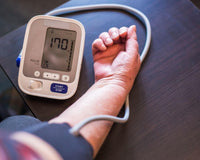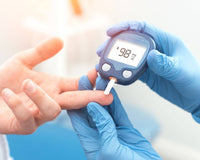Levothyroxine Interactions, Side Effects, Uses, & Dosage
Levothyroxine is a prescription medication that is available as a capsule or tablet. It also comes as an injectable solution given by a healthcare professional. Levothyroxine is available under the brand-names Levoxyl, Synthroid, and Unithroid or also as a generic drug. In this article we discuss the uses, side effects, and dosage of levothyroxine.
Why is Levothyroxine Used?
Levothyroxine capsules or tablets are used to treat hypothyroidism. This is a condition where your thyroid doesn’t produce enough thyroid hormone. Levothyroxine is also used to treat goiter—an enlarged thyroid gland. Interestingly, it may help treat certain forms of thyroid cancer too.
Levothyroxine Pronunciation
You can pronounce levothyroxine by sounding out these syllables:
Lee - vow - thai - raak - sn
How Does Levothyroxine Work?
Levothyroxine belongs to a class of drugs called hormones. A class of drugs is a group of medications that function in a similar way.
Levothyroxine works by providing the thyroid hormone that your thyroid would normally produce if it were functioning properly.
Side Effects of Levothyroxine
This medication can cause side effects. Some more common and serious than others.
Common Side Effects of Levothyroxine
The most commonly reported side effects of levothyroxine include:
- Increased appetite
- Weight loss
- Sensitivity to heat
- Sweating
- Hyperactivity
- Headache
- Anxiety
- Irritability
- Difficulty sleeping
- Diarrhea
- Vomitting
- Stomach cramps
Many of these side effects, if mild, can go away within a few days or a couple of weeks.
Serious Side Effects
Contact your doctor or pharmacist right away if you are experiencing any serious side effects. If you feel any of your symptoms are life threatening, go to the nearest emergency room. Serious side effects may include:
Heart attack symptoms:
- Chest pain
- Shortness of breath
- Severe discomfort in your upper body
Heart failure symptoms:
- Shortness of breath
- Swelling in your legs, ankles or feet
- Unexpected weight gain
- Irregular heart rhythm
Disclaimer: Our goal at ManifestRX is to provide you with the most relevant and current information. However, because drugs affect each person differently, we cannot guarantee that this information includes all possible side effects.
Medications That Interact With Levothyroxine
Levothyroxine may interact with other medications or supplements. To help avoid possible interactions always be sure to disclose with your doctor or pharmacist all of the medications, vitamins, or herbs you are currently taking. Examples of drugs that can cause interactions with levothyroxine include:
- Antidepressants like amitriptyline and maprotiline
- Blood thinners such as warfarin
- Ketamine
- Sympathomimetic drugs such as albuterol and pseudoephedrine
Interactions That May Make Your Drugs Less Effective
When you take levothyroxine with certain drugs, it may not work as well. The reason is because the amount levothyroxine in your body may decrease. Drugs that may make levothyroxine less effective include:
- Antidepressant sertraline: You doctor may need to increase your levothyroxine dosage if you are taking sertraline.
- Calcium carbonate or ferrous sulfate: Take levothyroxine at least 4 hours after or before taking either of these medications to ensure that levothyroxine is working well for you.
- Rifampin and anti-seizure drugs like carbamazepine and phenobarbital
- Orlistat
- Cancer medications that belong to the tyrosine-kinase inhibitors like imatinib
Disclaimer: Our goal at ManifestRX is to provide you with the most relevant and current information. However, because drugs affect each person differently, we cannot guarantee that this information includes all possible side effects.
How To Take Levothyroxine
It is important that you take this drug as directed by your healthcare professional. Your dosage of levothyroxine can depend on a few different things like:
- Your age
- How severe your condition is
- The condition being treated
- Your health and history
- How you react to the medication
Forms of Strengths of Levothyroxine
Generic: Levothyroxine
- Form: Oral tablet or capsule
- Strength: 25 mcg, 50 mcg, 75 mcg, 88 mcg, 100 mcg, 112 mcg, 125 mcg, 137 mcg, 150 mcg, 175 mcg, 200 mcg, 300 mcg
Brand: Synthroid
- Form: Oral tablet or capsule
- Strength: 25 mcg, 50 mcg, 75 mcg, 88 mcg, 100 mcg, 112 mcg, 125 mcg, 137 mcg, 150 mcg, 175 mcg, 200 mcg, 300 mcg
Brand: Levoxyl
- Form: Oral tablet or capsule
- Strength: 25 mcg, 50 mcg, 75 mcg, 88 mcg, 100 mcg, 112 mcg, 125 mcg, 137 mcg, 150 mcg, 175 mcg, 200 mcg
Brand: Unithroid
- Form: Oral tablet or capsule
- Strength: 25 mcg, 50 mcg, 75 mcg, 88 mcg, 100 mcg, 112 mcg, 125 mcg, 137 mcg, 150 mcg, 175 mcg, 200 mcg, 300 mcg
Dosage For Hypothyroidism
Ages 18-49 (Adult)
- Dosages are usually less than 200 mcg/day for adults. Your dosage, however, also depends on your age, weight, health, other medications you may be taking and how you respond to levothyroxine.
Ages 0-17 (Children)
For children the dosage depends entirely on thyroid hormone levels and weight.
Ages 50 and older (Senior)
The beginning dosage is 12.5-25 mcg/day.
The dosage may change, however, every few weeks based on your thyroid lab results.
Dosage For Goiter
Ages 18 and Older:
Your dosage is determined by your thyroid hormone levels.
Ages 0-17:
There are no recommended dosages for individuals younger than 18 years of age
Levothyroxine Interactions
Levothyroxine has black box warning. This is the most serious warning from the FDA (Food and Drug Administration). This alerts patients and doctors about drug effects that may be dangerous.
Important: Thyroid hormones, including levothyroxine should not be used for weight loss or as a treatment for obesity. Higher than recommended doses may lead to serious side effects.
Allergy Warnings
Levothyroxine can cause a severe allergic reaction. Stop taking levothyroxine immediately if you experience any of the following symptoms:
- Skin rash or hives
- Flushing
- Difficulty breathing
- Wheezing
- Stomach pain
- Swelling of your face, lips, throat or tongue
- Fever
Don’t take this drug again if you’ve ever had an allergic reaction to it. Taking it again could be fatal (cause death).
Can I Take Levothyroxine At Night?
Levothyroxine can be taken at bedtime to significantly improve hormone levels. It is completely safe to take before going to sleep.
Levothyroxine Interactions, Side Effects, Uses, & Dosage: Summary
Levothyroxine is a prescription medication that is available as a capsule or tablet used to treat hypothyroidism. Hypothyroidism is a condition where your thyroid doesn’t produce enough thyroid hormone.








